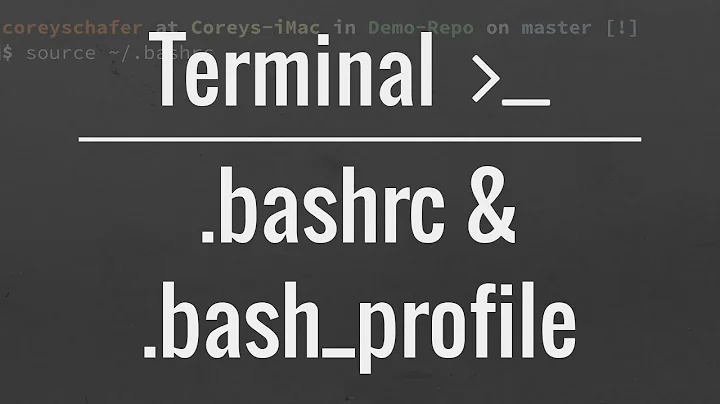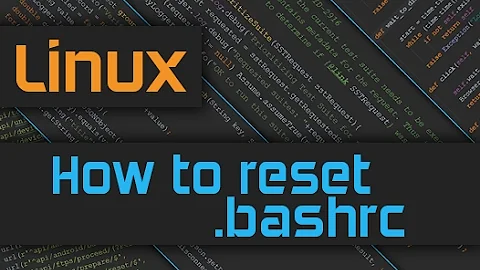Bash doesn't read .bashrc unless manually started
Solution 1
Why would it source it? Your default shell is not bash, but sh:
$ echo $SHELL
/bin/sh
In most modern systems, sh is a symlink to a basic shell. On my Debian for example:
$ ls -l /bin/sh
lrwxrwxrwx 1 root root 4 Aug 1 2012 /bin/sh -> dash
In your case, sh is a link to bash but, as explained in man bash:
If bash is invoked with the name sh, it tries to mimic the startup behavior of historical versions of sh as closely as possible, while conforming to the POSIX standard as well. [...] When invoked as an interactive shell with the name sh, bash looks for the variable ENV, expands its value if it is defined, and uses the expanded value as the name of a file to read and execute. Since a shell invoked as sh does not attempt to read and execute commands from any other startup files, the --rcfile option has no effect.
and
--norc
Do not read and execute the system wide initialization file /etc/bash.bashrc and the personal initialization file ~/.bashrc if the shell is interactive. This option is on by default if the shell is invoked as sh.
So, since your default shell is sh, .bashrc is not read. Just set your default shell to bash using chsh -s /bin/bash.
Solution 2
In .bash_profile make sure you have the following:
# .bash_profile
# If .bash_profile exists, bash doesn't read .profile
if [[ -f ~/.profile ]]; then
. ~/.profile
fi
# If the shell is interactive and .bashrc exists, get the aliases and functions
if [[ $- == *i* && -f ~/.bashrc ]]; then
. ~/.bashrc
fi
Related videos on Youtube
Jan
Updated on September 18, 2022Comments
-
Jan almost 2 years
I'm writing network analyzer and I need to filter packets saved in file, I have written some code to filter http packets but I'm not sure if it work as it should because when I use my code on a pcap dump the result is 5 packets but in wireshark writing http in filter gives me 2 packets and if I use:
tcpdump port http -r trace-1.pcapit gives me 11 packets.
Well, 3 different results, that's a little confusing.
The filter and the packet processing in me code is:
... if (pcap_compile(handle, &fcode, "tcp port 80", 1, netmask) < 0) ... while ((packet = pcap_next(handle,&header))) { u_char *pkt_ptr = (u_char *)packet; //parse the first (ethernet) header, grabbing the type field int ether_type = ((int)(pkt_ptr[12]) << 8) | (int)pkt_ptr[13]; int ether_offset = 0; if (ether_type == ETHER_TYPE_IP) // ethernet II ether_offset = 14; else if (ether_type == ETHER_TYPE_8021Q) // 802 ether_offset = 18; else fprintf(stderr, "Unknown ethernet type, %04X, skipping...\n", ether_type); //parse the IP header pkt_ptr += ether_offset; //skip past the Ethernet II header struct ip_header *ip_hdr = (struct ip_header *)pkt_ptr; int packet_length = ntohs(ip_hdr->tlen); printf("\n%d - packet length: %d, and the capture lenght: %d\n", cnt++,packet_length, header.caplen); }My question is why there are 3 different result when filtering the http? And/Or if I'm filtering it wrong then how can I do it right, also is there a way to filter http(or ssh, ftp, telnet ...) packets using something else than the port numbers?
Thanks
-
Sam Liao over 12 yearsDid you compare the difference or the result? Or could you attach the pcap file link, or it's hard to tell the cause.
-
-
Jeight over 10 years@terdon Your answer is the correct one. My answer would only be valid if he was running
bash. Nice catch, I missed that. -
haste over 10 yearsThank you. I assumed it didn't matter since
/bin/shpointed to/bin/bash. I suppose this issue stemmed from not explicitly assigning the shell to/bin/bashwhen I originally created the user account. -
kurtm over 10 yearsAlso, Debian/Ubuntu switched to
dashfor/bin/shas part of the effort to reduce startup time. This was hilarious when my users started asking why their shell acted differently. -
 Kusalananda almost 8 yearsThis might give you a few headaches if you run
Kusalananda almost 8 yearsThis might give you a few headaches if you runbashalongside another shell, such asksh93which uses.profileby default. -
g007 almost 7 yearsIf ~/.bash_profile doesn't exist, you can create it.
-
 Mitoxys almost 6 years.bashrc in Debain-based OS, .bash_profile in CentOS/Fedora/Mac OS
Mitoxys almost 6 years.bashrc in Debain-based OS, .bash_profile in CentOS/Fedora/Mac OS -
b-jazz over 4 years@Mitoxys bashrc and bash_profile serve two different purposes irrespective of what distro/OS you are running bash in.




